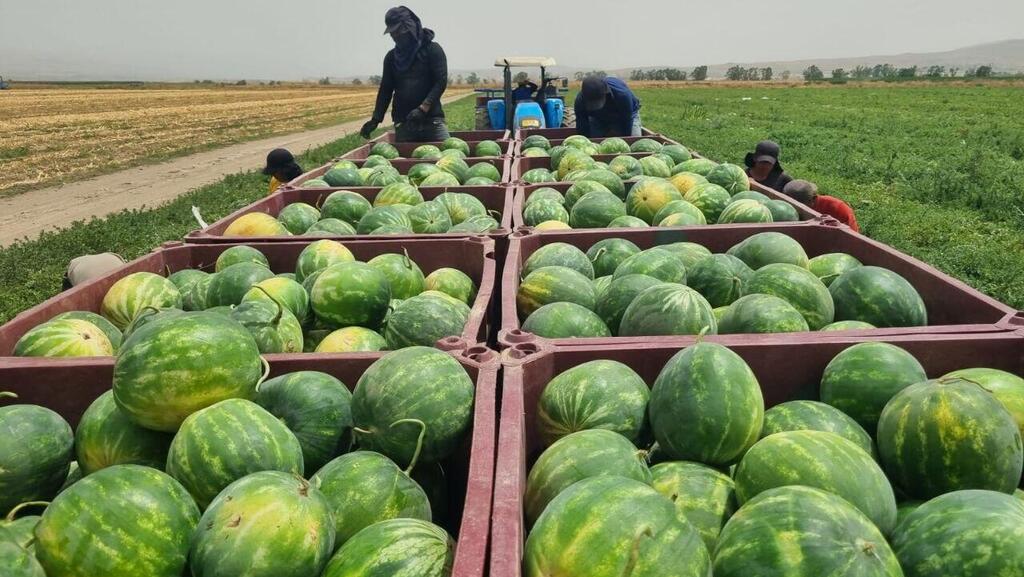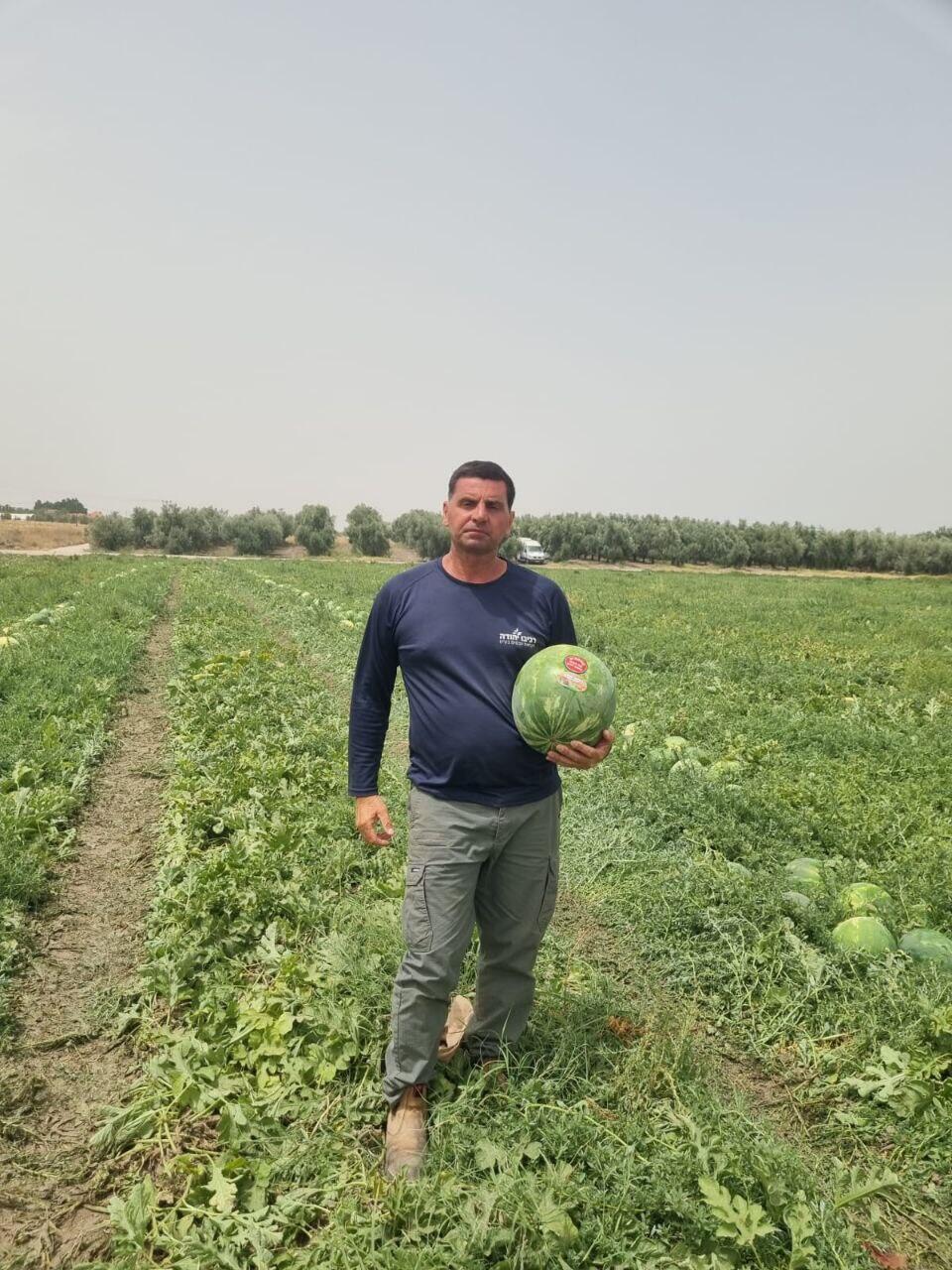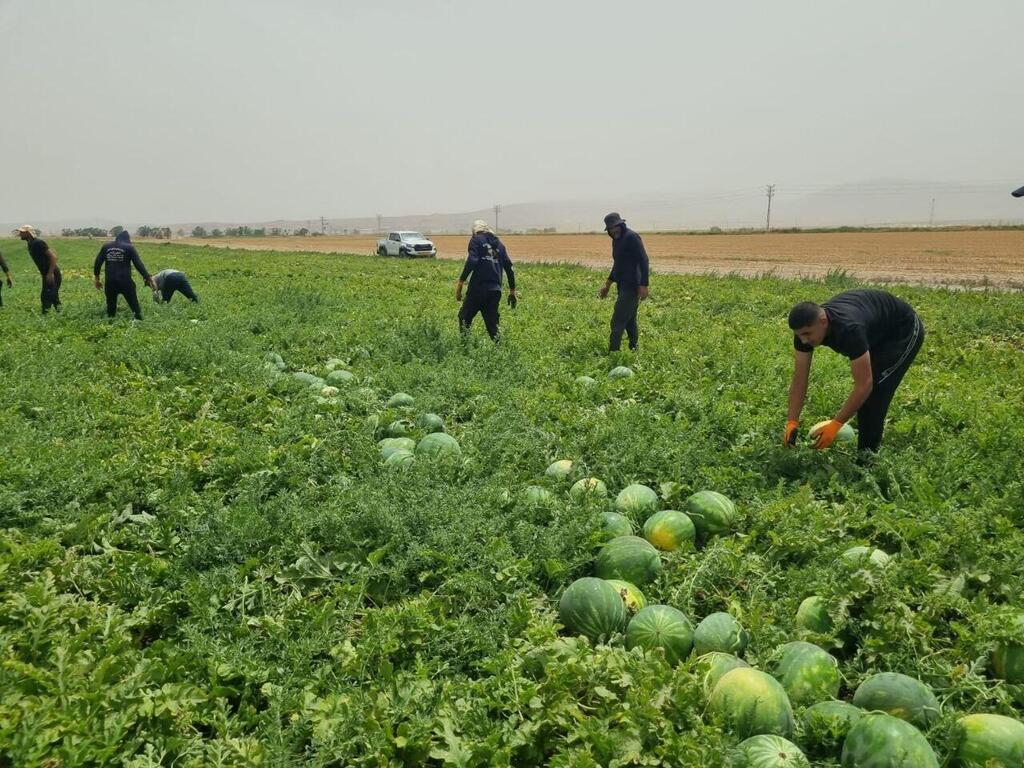Getting your Trinity Audio player ready...
In the lush watermelon fields of Moshav Revaya, close to the Jordan River in the Emek HaMa'ayanot Regional Council, farmers are racing the clock to keep up with the harvest. Sharly Revivo, owner of "Revivo Yehuda Agriculture and Assets Ltd.", cultivates around 124 acres of watermelons. "We're at the peak of watermelon season and in desperate need of skilled labor," explains Revivo. The harvest season starts in mid-May and runs through mid-June. "I can't just hire a worker or two off the street. Our workers are seasoned professionals who understand the job. It's extremely demanding work. We're reaching the point where it's harvest time, but we have no workers. Simply none. We see the fields bursting with watermelons. Fortunately, the weather is favorable for now. But if extreme weather hits, even for a single day, it could ruin everything."
In Israel, 154,000 tons of edible watermelons are grown annually, and the harvest is considered arduous work requiring high skill levels. Watermelon growers largely rely on Palestinian labor and do not receive quotas for Thai workers.
Meir Yifrach, Chairman of the Vegetable Sector at the Plants Council, stated, "Farmers face different challenges in turn. Right now, it's the watermelon growers' plight. They rely on workers from the territories since they have no quotas for Thai workers. However, entry is barred for these workers. Some farmers have smuggled illegal workers and got caught. It’s not my job to defend offenders, but about 15 growers are left without a solution. Watermelons remain in the fields, and ultimately, consumers will pay more. The workers aren't there, and the farmers are left high and dry. I am trying to find solutions with the Ministry of Agriculture, but no one answers."
Currently, a farmer receives an average of $0.70 per pound of watermelon. From there, it goes to wholesalers (where the wholesale market price averages about $1 per pound) and then to retailers, selling to consumers at an average price of $1.15-$1.70 per pound. According to Yifrach, farmers have no influence on the retail price of watermelons, but there is concern that if the labor shortage persists, fewer watermelons will reach the market, driving consumer prices up to potentially $2.85 per pound. If no solution is found for the labor shortage, an entire season could be lost for the farmers, potentially leading to financial difficulties and even bankruptcy.
At the beginning of the watermelon season, produce comes from the Arava region, followed by areas north of the Dead Sea, Beit She'an Valley, Gilboa, and the western Negev. Toward the end of the season, watermelons come from the western Galilee, Golan Heights, Negev, and central regions. Annually, Israel cultivates about 154,000 tons of edible watermelons on approximately 5,700 acres, most of which are seedless. Additionally, there is a sector in Israel dedicated to growing watermelons for seed production, covering about 20,000 acres and producing around 6,500 tons of seeds for cracking. In the central Arava, for example, the watermelon season has already ended. About 700 foreign workers left the area and later returned, so there was no significant shortage of workers.
"I alone need 21 workers," says Ravivo. "Right now, I have 10 unskilled workers. Their productivity is half that of the Palestinian workers. Eventually, prices will rise. But there's something beyond that. You cultivate something. You nurture it. Watching it burn before your eyes is very hard for me."
Kedah Omar, a resident of Kafr Manda in the north who grows 370 acres of watermelons, shared, "I am among the leading growers in the Arab sector. My business has been around for 34 years. I had 20-30 workers through a subcontractor bringing them from the territories. They did all the work, with permits and everything. I contacted the Ministry of Agriculture, here and there, even the Israeli police. It’s impossible to harvest watermelons. There are no workers. Harvesting watermelons is hard labor, and there are workers who know how to do it. Today, we pay $680 per day to a Sudanese laborer, and even he doesn’t match the productivity of a worker from the territories. Eventually, watermelons will become more expensive. The watermelons will end up being devoured by the sun."
The Ministry of Agriculture stated that it intends to publish a call in the coming days for farmers who employed Palestinian laborers, allowing them to receive an allocation of foreign ones: "With the outbreak of events on October 7, the Ministry of Agriculture immediately mobilized to assist farmers in the field, aiming to maintain functional continuity along the supply chain and, consequently, national food security. Since October 7, agriculture in Israel has faced the largest labor crisis since the establishment of the state.
This is due to many workers being drafted into reserve service or not reporting to work out of fear, foreign workers requesting to return to their home countries, laborers from Palestinian territories under lockdown, and the evacuation of many residents. All these factors have led to difficulties in workers reaching their jobs. During the war, the ministry published three calls for farmers who employed Palestinian workers, allowing them to receive an allocation of foreign workers, and intends to publish another call in the coming days."
First published: 09:00, 06.01.24





